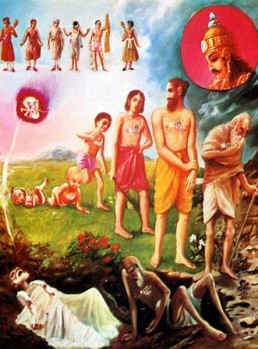Swami Chinmayananda
Swami Chinmayananda Commentary
This stanza labours to deny in the Self all the symptoms of mutability that are recognised and experienced by the body. The body is prone to different changes and these modifications are the sources of all sorrows in every embodiment. These six changes are common to all, and they may be enumerated as: birth, existence, growth, decay, disease and death. These changes are the common womb of all pains in a mortal’s life. All these are denied in the Self, in this stanza, to prove the immutability of the Self.
Unlike the physical body, the Self is not born, It being the Eternal Factor that exists at all times. Waves are born and they die away but the ocean is not born with the waves; nor does it die away when the waves disappear. Since there is no birth, there is no death; things that have a beginning alone can end; the rising waves alone can moan their dying conditions. Again, it is explained that like the birth of a child, who was not existing before and who has come to exist after the birth, the Atman is not something that has come to be born due to or because of the body. Thus, the Self is unborn and eternal — birthless and deathless (Ajah, Nityah).
HAVING THUS STATED THE PROPOSITION THAT THE SELF IS NEITHER AN AGENT NOR AN OBJECT OF THE ACTION OF SLAYING, AND HAVING ESTABLISHED, BY ARGUMENTS, THE IMMUTABILITY OF THE SELF, LORD KRISHNA HERE CONCLUDES THE PROPOSITION AS FOLLOWS:
Adi Sankara Commentary
Na kadacit, neverl; is ayam, this One; jayate, born i.e. the Self has no change in the form of being born — to which matter is subject –; va, and (– va is used in the sense of and); na mriyate, It never dies. By this is denied the final change in the form of destruction. The word (na) kadacit), never, is connected with the denial of all kinds of changes thus — never, is It born never does It die, and so on. Since ayam, this Self; bhutva, having come to exist, having experienced the process of origination; na, will not; bhuyah, again; abhavita, cease to be thereafter, therefore It does not die. For, in common parlance, that which ceases to exist after coming into being is said to die. From the use of the word va, nor, and na, it is understood that, unlike the body, this Self does not again come into existence after having been non-existent. Therefore It is not born. For, the words, ‘It is born’, are used with regard to something which comes into existence after having been non-existent. The Self is not like this. Therfore It is not born. Since this is so, therefore It is ajah, birthless; and since It does not die, therefore It is nityah, eternal. Although all changes become negated by the denial of the first and the last kinds of changes, still changes occuring in the middle [For the six kinds of changes see note under verse 2.10.-Tr.] should be denied with their own respective terms by which they are implied. Therefore the text says sasvatah, undecaying,. so that all the changes, viz youth etc., which have not been mentioned may become negated. The change in the form of decay is denied by the word sasvata, that which lasts for ever. In Its own nature It does not decay because It is free from parts. And again, since it is without qualities, there is no degeneration owing to the decay of any quality. Change in the form of growth, which is opposed to decay, is also denied by the word puranah, ancient. A thing that grows by the addition of some parts is said to increase and is also said to be new. But this Self was fresh even in the past due to Its partlessness. Thus It is puranah, i.e. It does not grow. So also, na hanyate, It is puranah, i.e. It does not grow. So also, na hanyate, It is not killed, It does not get transformed; even when sarire, the body; hanyamane, is killed, transformed. The verb ‘to kill’ has to be understood here in the sense of transformation, so that a tautology [This verse has already mentioned ‘death’ in the first line. If the verb han, to kill, is also taken in the sense of killing, then a tautology is unavoidable.-Tr.] may be avoided. In this mantra the six kinds of transformations, the material changes seen in the world, are denied in the Self. The meaning of the sentence is that the Self is devoid of all kinds of changes. Since this is so, therefore ‘both of them do not know’ — this is how the present mantra is connected to the earlier mantra.
The Bhagavad Gita with the commentary of Sri Sankaracharya – Translated by Alladi Mahadeva Sastry
Holy Geeta – Commentary by Swami Chinmayananda
The Bhagavad Gita by Eknath Easwaran – Best selling translation of the Bhagavad Gita
The Bhagavad Gita – Translation and Commentary by Swami Sivananda
Bhagavad Gita – Translation and Commentary by Bhaktivedanta Swami Prabupadha
Srimad Bhagavad Gita Chapter 2 – Verse 20 – 2.20 na jayate mriyate – All Bhagavad Gita (Geeta) Verses in Sanskrit, English, Transliteration, Word Meaning, Translation, Audio, Shankara Bhashya, Adi Sankaracharya Commentary and Links to Videos by Swami Chinmayananda and others – 2-20

